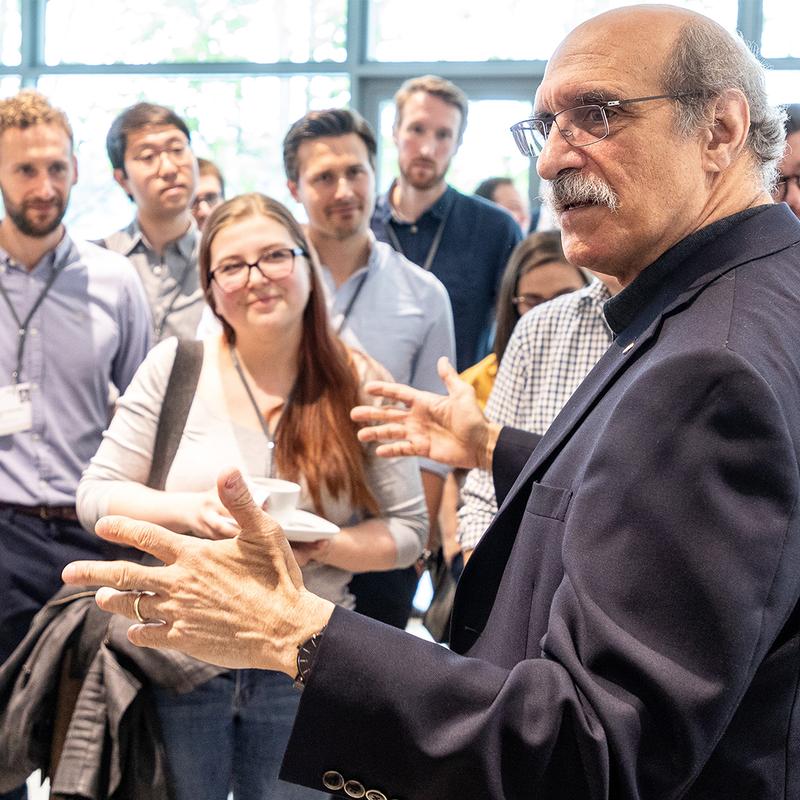

Nobel Laureate Martin Chalfie talking to young scientists during the 68th Lindau Nobel Laureate Meeting
Christian Flemming/Lindau Nobel Laureate Meetings
To mark the 70th Lindau Nobel Laureate Meeting, the organisers are delighted to announce that a record number of highly decorated scientists will be attending: Around 70 Laureates have already agreed to take part during the week from June 28 to July 3, 2020.
That is almost twice as many as at recent meetings. The reason is that every five years – as now in 2020 – an interdisciplinary Meeting is held at which all three Nobel Prize scientific disciplines are represented (2015: 65 Laureates).
Countess Bettina Bernadotte, President of the Council, commented: “We are glad to have a network of scientists that spans the world and bridges the generations. In the history of the conferences since 1951, the relevance of science has been reported again and again, also basic research, which is, after all, an open-ended research. And in later years, its benefits for society became clear – for example magnetic resonance imaging (MRI) or cancer therapy as well as, more recently, the lithium-ion battery in all our mobile devices.“
From among the latest laureates, William Kaelin, Jr., Michel Mayor, Olga Tokarczuk and M. Stanley Whittingham are expected to attend. In addition, nine other Laureates will be in Lindau for the first time at the end of June. Whereas Robert Huber (Chemistry, 1988) will be there for the 24th time.
The Lindau Nobel Laureate Pier inaugurated in 2019 near the Inselhalle will also see some additions: Every one of the approx. 400 Laureates who have taken part in Meetings since 1951 is honoured here with an engraved plaque. The Founders Assembly established to mark the 50th anniversary has meanwhile similarly grown large: It now comprises 350 members, all of whom with but a few exceptions are Nobel Laureates.
Almost 200 academic partners worldwide – academies, universities and foundations – have nominated young researchers from over 100 countries to take part in the unique exchange of ideas among scientists in Lindau (selection process still under way, participants in this group to be determined by end of February). The Nobel Laureates represent 13 different nationalities.
Scientists both young and old will together discuss the “Lindau Guidelines“ and adopt these in the course of the Meeting: They are intended as an aid to orientation for global, sustainable and open, that is to say, cooperative science in the 21st century. This initiative can be traced back to Nobel Laureate Elizabeth Blackburn (Physiology or Medicine, 2009) and the 68th Lindau Meeting.
The traditional International Day on the Monday of the week will be shaped by the United Kingdom as host country. Among other highlights, Royal Society President Venkatraman Ramakrishnan (Chemistry, 2009), will report on the story so far: 150 days after Brexit, what is the status of the country’s science and its relations with the EU?
A little less than three months before the Meeting, another major milestone awaits: On Monday, April 6, 2020, Edmond Fischer (Medicine or Physiology, 1992) will be 100 years old. He has already participated eleven times in the Lindau Meetings and has been invited by the organizers to deliver this year’s “Life Lecture“, the final highlight of the programme.
In addition to the interdisciplinary Meeting, the triennial Lindau Meeting on Economic Sciences will be held at the end of August (25.-29.8.).
About the Lindau Nobel Laureate Meetings
Since their foundation in 1951 the Lindau Nobel Laureate Meetings have developed into a unique international scientific forum. The annual Meetings provide an opportunity for an exchange between different generations, cultures and disciplines. The theme of the Meetings alternates between Physiology and Medicine, Physics or Chemistry – the three Nobel Prize scientific disciplines. Every five years an interdisciplinary Meeting takes place, while the Lindau Meeting on Economic Sciences is held every three years. Through the medium of various declarations (2015 on Climate Change, 1955 Against the Use of Nuclear Weapons) the scientists have repeatedly joined in the public debate with political appeals.
It was the Lindau physicians Franz Karl Hein and Gustav Wilhelm Parade who approached Count Lennart Bernadotte af Wisborg with the idea of a conference of Nobel Laureates and proceeded to jointly implement this – since 1953 with the participation of junior scientists. Some 33,000 students, PhD candidates and post-docs have since taken part. Their experience of the Meeting may be literally once-in-a-lifetime, but they remain permanent members of the Lindau Alumni Network and ambassadors for scientific dialogue.
All year long the Lindau Nobel Laureate Meetings continue to pursue their “Mission Education” aimed at emphasizing the importance of science and advocating science and research. This is also the purpose for which an online mediateque is being developed as a learning platform which includes teaching materials for schools.
https://www.lindau-nobel.org/wp-content/uploads/2020/02/PR_Outlook_70th_Lindau_M…
http://www.mediatheque.lindau-nobel.org/meetings/2020 Further statistics and a list of all participating Nobel Laureates
http://www.lindau-nobel.org/press Accreditation for the 70th Lindau Nobel Laureate Meeting available from March












